Profit and prosper with the best of Kiplinger's advice on investing, taxes, retirement, personal finance and much more. Delivered daily. Enter your email in the box and click Sign Me Up.
You are now subscribed
Your newsletter sign-up was successful
Want to add more newsletters?

Delivered daily
Kiplinger Today
Profit and prosper with the best of Kiplinger's advice on investing, taxes, retirement, personal finance and much more delivered daily. Smart money moves start here.

Sent five days a week
Kiplinger A Step Ahead
Get practical help to make better financial decisions in your everyday life, from spending to savings on top deals.

Delivered daily
Kiplinger Closing Bell
Get today's biggest financial and investing headlines delivered to your inbox every day the U.S. stock market is open.

Sent twice a week
Kiplinger Adviser Intel
Financial pros across the country share best practices and fresh tactics to preserve and grow your wealth.

Delivered weekly
Kiplinger Tax Tips
Trim your federal and state tax bills with practical tax-planning and tax-cutting strategies.

Sent twice a week
Kiplinger Retirement Tips
Your twice-a-week guide to planning and enjoying a financially secure and richly rewarding retirement

Sent bimonthly.
Kiplinger Adviser Angle
Insights for advisers, wealth managers and other financial professionals.

Sent twice a week
Kiplinger Investing Weekly
Your twice-a-week roundup of promising stocks, funds, companies and industries you should consider, ones you should avoid, and why.

Sent weekly for six weeks
Kiplinger Invest for Retirement
Your step-by-step six-part series on how to invest for retirement, from devising a successful strategy to exactly which investments to choose.
Looking around the world, who works the most hours? Makes the most money? Has the most leisure time? Or shells out the most for rent?
Take a look at our comparisons of some common workplace, quality-of-life and cost-of-living indicators from capital cities around the globe.
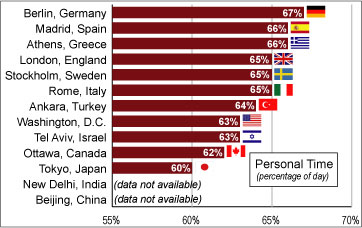
Most Time on the Clock
Though workweeks vary in different cities, happy hour clearly starts earliest in Berlin, at least based on hours worked. Or maybe Berliners just get to sleep in longer. In places where six-day workweeks are typical -- in Israel, for example -- lengthy midday breaks, half days on Fridays or Saturdays or an otherwise more flexible schedule are commonplace.
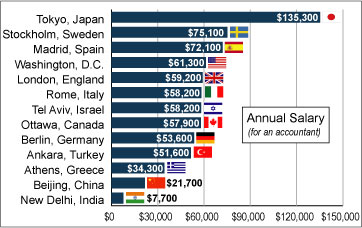
Most Personal Time
Not surprisingly, given that they work the fewest hours, Germans have the most time to spend on themselves during the week. Berliners spend two-thirds of their day enjoying leisure and personal activities: exercising, shopping, nightlife and whatnot, as well as sleeping, eating and other nonwork pursuits.
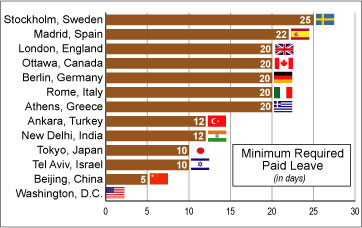
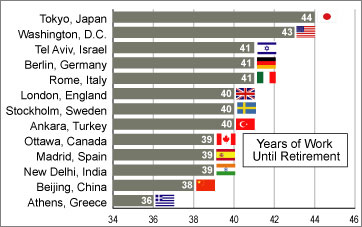
Most Paid Leave
Shown here is the federally mandated minimum number of days of leave that employers must offer employees. The numbers don't include paid holidays, which tack on 10 days or so, on average. Note that the U.S. does not mandate paid leave as do other countries. However, private employers give American workers an average of 10 days of paid time off a year.
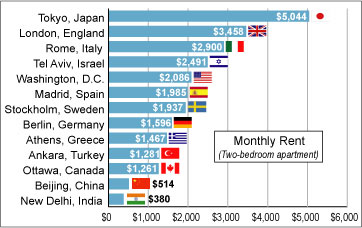
Longest Wait for Retirement
This slide shows how many years the average 24-year-old worker can expect to work until retirement at the current average retirement age. Keep in mind that the retirement age is bound to go up by the time young workers are ready to retire, since these average retirement ages are deemed too low in nearly all of our countries.
Note that under today's standards, a young professional in Tokyo will have to work a full eight years longer than his or her counterpart in Athens.
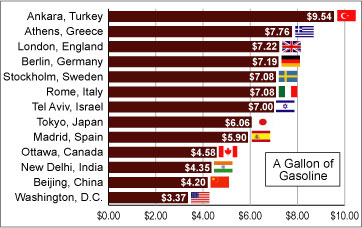
Priciest Rent
Average rent as shown here is for two-bedroom digs in a trendy, convenient part of town. It's a good thing that folks in Tokyo earn the highest salaries because they need them to put a roof over their heads. The average rent in the city is nearly 50% higher than in the runner-up, London.
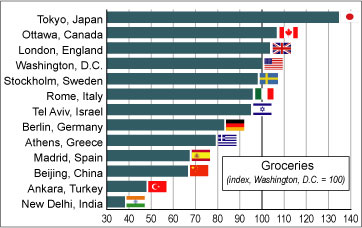
Highest Cost of Filling the Tank
Despite the rising cost of gasoline in the U.S. in recent years, the average retail cost of a gallon of gas in Washington, D.C. -- $3.37 -- is much lower than in its capital counterparts throughout the world. Ankara is the standout here, with gasoline costing drivers a whopping $9.54 a gallon (yes, we converted liters to gallons). Drivers in countries belonging to the European Union are subject to several dollars in value-added tax and fuel taxes, whereas drivers in the U.S. pay 48¢ a gallon on average for state and federal road levies.
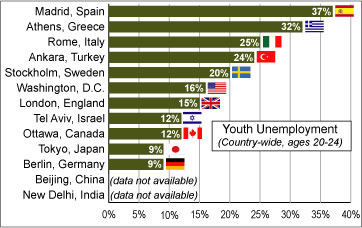

Highest Youth Unemployment
Sure, it's not easy for college grads to find work in Washington -- or elsewhere in the U.S., for that matter -- but they have an easier time of it than their counterparts in Madrid. High unemployment rates among educated young people are helping to fuel many of the protests around the world, including the Occupy Wall Street movement in the U.S.

Profit and prosper with the best of Kiplinger's advice on investing, taxes, retirement, personal finance and much more. Delivered daily. Enter your email in the box and click Sign Me Up.
-
 How to Watch the 2026 Winter Olympics Without Overpaying
How to Watch the 2026 Winter Olympics Without OverpayingHere’s how to stream the 2026 Winter Olympics live, including low-cost viewing options, Peacock access and ways to catch your favorite athletes and events from anywhere.
-
 Here’s How to Stream the Super Bowl for Less
Here’s How to Stream the Super Bowl for LessWe'll show you the least expensive ways to stream football's biggest event.
-
 The Cost of Leaving Your Money in a Low-Rate Account
The Cost of Leaving Your Money in a Low-Rate AccountWhy parking your cash in low-yield accounts could be costing you, and smarter alternatives that preserve liquidity while boosting returns.
-
 I Need to Cut $1,000 From My Monthly Budget, and I've Already Given Up Starbucks and Dining Out. What Else Can I Do?
I Need to Cut $1,000 From My Monthly Budget, and I've Already Given Up Starbucks and Dining Out. What Else Can I Do?Here are some creative ways to save up to $1,000 a month, even if you feel like you've already made all of the obvious cuts.
-
 I'm a Government Employee and Need to Get By Until the Shutdown Ends. What Can I Do?
I'm a Government Employee and Need to Get By Until the Shutdown Ends. What Can I Do?The second-longest shutdown in history is leaving many federal workers with bills due and no paycheck to cover them. Here's what you can do to get by.
-
 What to Do With Your Tax Refund: 6 Ways to Bring Growth
What to Do With Your Tax Refund: 6 Ways to Bring GrowthUse your 2024 tax refund to boost short-term or long-term financial goals by putting it in one of these six places.
-
 What Does Medicare Not Cover? Eight Things You Should Know
What Does Medicare Not Cover? Eight Things You Should KnowMedicare Part A and Part B leave gaps in your healthcare coverage. But Medicare Advantage has problems, too.
-
 12 Great Places to Retire in the Midwest
12 Great Places to Retire in the MidwestPlaces to live Here are our retirement picks in the 12 midwestern states.
-
 15 Cheapest Small Towns to Live In
15 Cheapest Small Towns to Live InThe cheapest small towns might not be for everyone, but their charms can make them the best places to live for plenty of folks.
-
 Best Cold Weather Places to Retire
Best Cold Weather Places to RetirePlaces to live Some like it hot; others, not so much. Here are the 12 best places to retire if you can't stand the heat.
-
 15 Reasons You'll Regret an RV in Retirement
15 Reasons You'll Regret an RV in RetirementMaking Your Money Last Here's why you might regret an RV in retirement. RV-savvy retirees talk about the downsides of spending retirement in a motorhome, travel trailer, fifth wheel, or other recreational vehicle.
